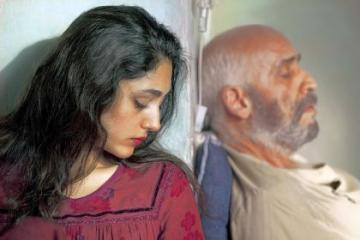`The Patience Stone': Confessions abound in moving tale from Afghanistan
In a war-torn Afghani village near
Abandoned by her husband’s Jihadist comrades as well as his own brothers, she is struggling to survive while waiting for him to resurrect: How to feed herself and two demanding kids? Where to find money to buy medicine for him? The only employment opportunity for an Afghan woman in her situation is prostitution.
“The Patience Stone” will fascinate Islamophiles and Islamophobes alike (I’m neither, myself) for the tour-de-force performance of its beautiful leading lady, Iranian actress Golshifteh Farahani, whose sole English-language role to date was in Ridley Scott’s “Body of Lies” (2008).
Here, as the nameless, timid, Muslim heroine, she improvises an IV-drip and then begins quietly telling her unconscious spouse the conscious truth about herself and their relationship---all the secrets she could never dare to reveal before---emboldened by his inability to respond. He has become her [italic] syngue sabour [unital]---the magic “patience stone” of Persian mythology, which absorbs all the miseries and misfortunes you confide to it---until it finally shatters from the load and delivers you from your pain.
During her biblical Lamentations---or the Koranic equivalent---we learn he was constantly absent, presumably on jihad business, even on their wedding day (she was symbolically married to his photograph!). Now freed to say everything she wants in confessional mode, she and her ruminations are interrupted by the periodic booming of rocket attacks and the mindless brutality of militia rampages all around her.
“The Patience Stone” is
Talk about a tough role: Ms. Farahani must play opposite a mute, motionless body virtually the whole time. It’s essentially a one-woman show of female Muslim suppression and liberation, and, as such, an excellent star vehicle for her. Though Massi Mrowat as a stammering boy soldier and Hassina Burgan as a worldly-wise aunt are both fine, Farahani carries the film with her perpetually anxious face and delicate shades of emotion---fear, shame, desire, remorse---in response to those Satanic verses that inspire the males. She is magnetic. The performance is exquisite. The minimalist music and muted cinematography are perfect.
The “feel” is Italian neo-Realist, akin to Rosselini, and in a way to Bergman. Remember Liv Ullmann’s incredible 30-minute monologue in her shrink’s office in “Heart to Heart”?
“Patience Stone” is totally apolitical (in terms of the Afghan fighting factions), but I hope its makers and performers are well protected. They’d be ripe for Salmon Rushdie-style interdiction for producing such a powerful allegory of the state of Afghan women: It’s perfectly allowable there for a father to give away one of his daughters to pay off a cockfighting bet.
Change doesn’t come through guns but through culture, Rahimi says---and women change the culture.” This riveting, poetic film is a test of our listening skills, as much as the comatose husband’s.
(In Farsi with English subtitles.)






